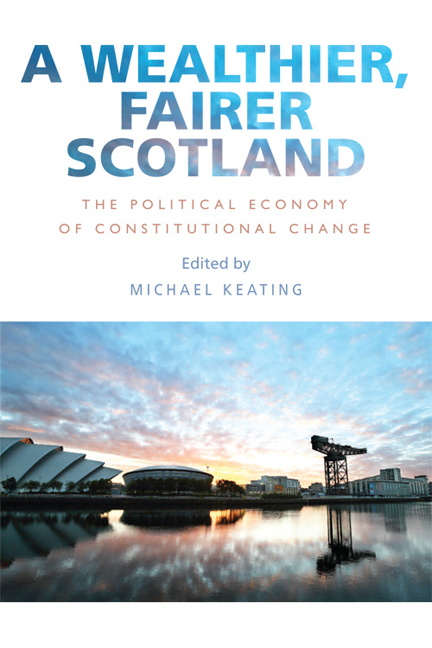Book contents
- Frontmatter
- Contents
- List of Figures
- List of Tables
- List of Contributors
- Preface
- 1 The Political Economy of Devolution
- 2 Taxes and Spending
- 3 Inequality in Scotland: Dimensions and Policy Responses
- 4 Towards a Fairer Scotland? Assessing the Prospects and Implications of Social Security Devolution
- 5 A More Gender-Equal Scotland? Childcare Policy in Scotland after the Independence Referendum
- 6 Constitutional Change, Social Investment and Prevention Policy in Scotland
- 7 Getting to a Wealthier and Fairer Scotland
- References
- Index
3 - Inequality in Scotland: Dimensions and Policy Responses
Published online by Cambridge University Press: 22 December 2017
- Frontmatter
- Contents
- List of Figures
- List of Tables
- List of Contributors
- Preface
- 1 The Political Economy of Devolution
- 2 Taxes and Spending
- 3 Inequality in Scotland: Dimensions and Policy Responses
- 4 Towards a Fairer Scotland? Assessing the Prospects and Implications of Social Security Devolution
- 5 A More Gender-Equal Scotland? Childcare Policy in Scotland after the Independence Referendum
- 6 Constitutional Change, Social Investment and Prevention Policy in Scotland
- 7 Getting to a Wealthier and Fairer Scotland
- References
- Index
Summary
Introduction
Inequality has become a touchstone issue in political debate across the developed world. Stagnant or declining living standards among the low paid have given the lie to belief in the ‘trickle down’ effect where unfettered markets would generate benefits for the poor as well as the rich. The lack of such effects has been associated with growing disenchantment with the incumbent political class who seem impotent or unwilling to introduce policies that would increase the living standards of poor people, and in turn this disenchantment has been associated with the emergence of new political movements of the right and left.
Having been ignored for decades by international economic organisations, inequality is now viewed not only as an issue of social justice, but also as an impediment to economic growth by organisations including the OECD (Cingano 2014), the World Bank (2014), the IMF (Dabla-Norris et al. 2015) and the European Union (2015). Within Scottish politics, inequality played an important role in the constitutional debate. Successive Scottish governments have been committed to tackling inequalities, sometimes drawing on myths about the Scottish egalitarian tradition. This chapter explores inequality in Scotland and the scope for policy intervention by the Scottish Government to reduce its level or to mitigate its effects. To put these issues in perspective, the next section considers inequality within its wider national and international context, beginning with an initial examination of the concept of inequality. We go on to consider alternative theories of its drivers and the extent to which its growth may be susceptible to policy intervention at the Scottish level. We also highlight the importance of intergenerational inequality – the extent to which generations place burdens on, or transfer benefits to, future generations. This occupies an important position in the current inequality debate.
We then consider whether sub-state governments (SSGs) can successfully introduce their own form of interventions to reduce inequality and the extent to which these are constrained by national policy frameworks. If Scotland wished to pursue its own inequality strategy, its freedom to do so is inevitably constrained by UK economic policies and by the UK institutional and legal environment. The following section summarises what we know about inequality in Scotland, while the final section concludes with some discussion of the opportunities available to the Scottish Government to influence inequality in Scotland.
- Type
- Chapter
- Information
- A Wealthier, Fairer ScotlandThe Political Economy of Constitutional Change, pp. 55 - 73Publisher: Edinburgh University PressPrint publication year: 2017

